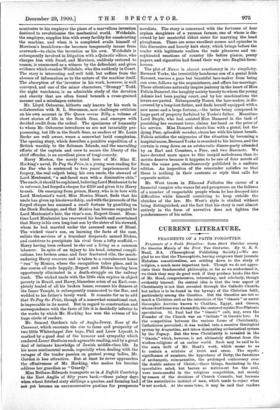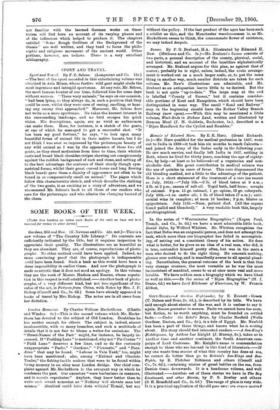C URRENT LITERATURE.
FRAGMENTS OF A FAITH FORGOTTEN.
Fragments of a Faith Forgotten : Some Short Sketches among the Gnostics Mainly of the First Two Centuries. By G. R. S. Mead, B.A. (Theosophical Publishing Society.) —We are glad to see that the Theosophists, having outgrown their juvenile Mahatma sensationalism, are settling down to the study of religion, a much more important task. Though we do not appre- ciate their fundamental philosophy, so far as we understand it, we think they may do good work if they produce books like this of Mr. Mead, comprehensive, interesting, and scholarly, though evidently biassed. Its central idea is that the true aspect of Christianity is not that revealed through the Catholic Church, but rather is to be found in the byways of the Christian faith, particularly among the Gnostics. But the Gnostics are not so much a Christian sect as the inheritors of the " Gnosis" or secret theosophic doctrine known to Chaldtea, Egypt, and Greece, whose chief home was Alexandria, the centre of mystic Neo-Platonic speculation. St. Paul had the " Gnosis " cult, nay, even the Founder of the Church was an " initiate " in Gnostic lore. In the competition between the various forms of Christianity, Catholicism prevailed; it was welded into a massive theological system by Augustine, and into a dominating ecclesiastical system by the Papacy. But the true Christianity is revealed in the "Gnosis," which, however, is not ultimately different from the wisdom-religions of an earlier world. Such may be said to be the main drift of Mr. Mead's work, which seems to us to contain a mixture of truth and error. The mystic significance of numbers, the hypostases of Deity, the functions of archangels, reincarnation, the prolonged controversy over the double nature of Christ,—these things, fascinating to the speculative mind, but barren as nutriment for. the soul, were unsuccessful in the religious competition, not merely by reason of the decisions of Church Councils, but because of the assimilative instinct of man, which tends to reject what is not needed. At the same time, it may be said that readers
not familiar with the learned German works on Gnos- ticism will find here an account of its varying phases and of the influences which helped to produce it. The chapters entitled "Some Rough Outlines of the Background of the Gnosis" are well written, and they tend to focus the philo- sophic and religious movement of the ancient world. Other portions, however, are tedious. These is a very excellent oibliography.



































 Previous page
Previous page